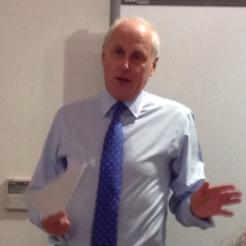Lord Hodgson may have handed the sector a “poisoned chalice” by passing the buck on fundraising self-regulation to the fundraising bodies themselves, according to Institute of Fundraising chair Mark Astarita.
Meanwhile Lord Hodgson (pictured), for his part, has publicly criticised the various fundraising factions for seeking to blame each other for the inherent problems in self-regulation.
One of Hodgson’s Charities Act review recommendations was that the Office for Civil Society and the Charity Commission should gather together all the organisations involved in regulating fundraising to thrash out a single, sector-funded, public-facing self-regulatory scheme that covers all types of fundraising.
Astarita told civilsociety.co.uk that while he understood the desire to sort out the existing confusion, the fact that Lord Hodgson didn’t propose a solution himself shows just how hard it is to solve.
He said: “Yes we need to get in a room and resolve these things, and a lot more coming together might be very helpful. But it is easier said than done, especially when it comes to the collections regime – he has no idea how big a challenge this is.
“In passing the buck to the sector to sort this out, Hodgson may well have handed us a poisoned chalice.
“I’m not saying it is not in a muddle, but the reason it is in a muddle is because it is very hard to do, and we’ve not been keen to spend a whole lot of time and money resolving it.”
Lewis: scale of complaints very small
The Institute’s chief executive Peter Lewis also tackled Hodgson about the recommendation at yesterday’s launch of the review. He said the sector “is not complacent” about the problem but warned him to be careful that “we don’t invent a system that is far too bureaucratic and expensive compared to the problem that is there”.
Lewis reminded Hodgson that the scale of complaints compared to the scale of the ask is “very very small”.
But Hodgson did not budge. He pointed out that Lewis was referring merely to complaints to the FRSB, whereas only around 3 per cent of fundraising charities are signed up to the FRSB, and told him “you need to think more widely about how many complaints there might be”.
Hodgson: fundraising is hardest problem to solve
Hodgson acknowledged that fundraising was the hardest subject to tackle in the review. But the fundraising sector needed to accept that there is a high level of public concern about fundraising, and address it properly.
He said that he was disappointed that everyone in the fundraising sector seemed to think it wasn’t their responsibility, with those in the face-to-face sector blaming direct mail and those in direct mail saying telephone fundraising is the problem, for example.
“The fact is. the sector has to realise there is a public concern. So I have suggested that Nick [Hurd] and his colleagues should gather together the bodies that are concerned with fundraising to discuss the overall strategy and agree process. And if that means a certain amount of pooling of sovereignty, well then sovereignty must be pooled.”
“Otherwise, Nick will be forced to step in and set up a statutory scheme and I do not believe that will be paid for by the taxpayer. And it will be expensive.”










